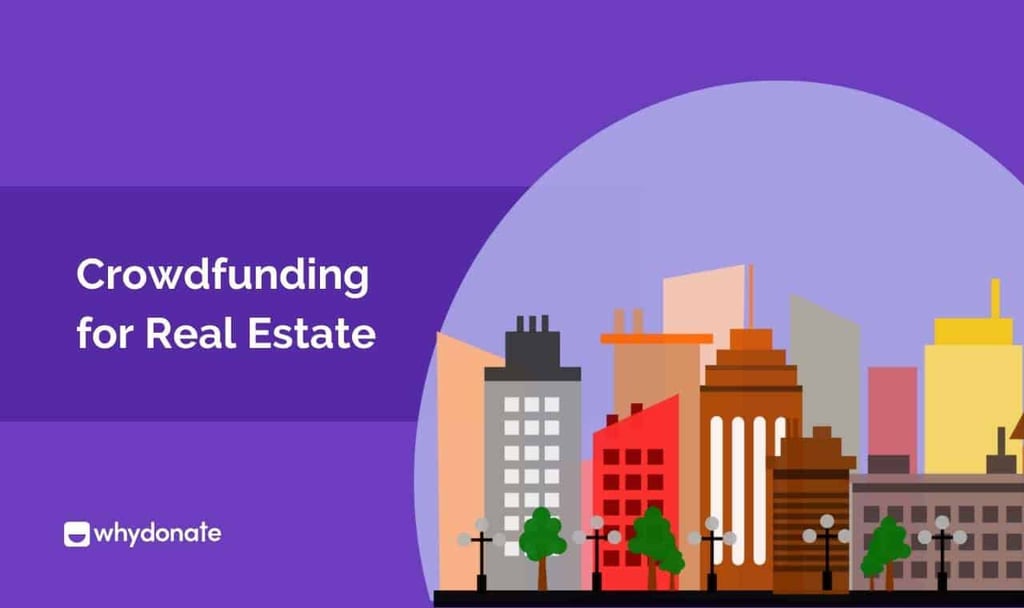Crowdfunding for real estate projects provides an accessible and transparent alternative to traditional bank loans. It enables both individuals and organizations to attract supporters from across the globe. These donors or small investors are often driven by the impact of your project, whether it’s community housing or sustainable development.
This approach also offers a faster and less bureaucratic way to gather funding, especially for those without access to big financial institutions. Unlike traditional property financing, real estate crowdfunding platforms offer scalability, speed, and engagement. Fundraisers can also control how their campaign is marketed and shared, ensuring a more authentic and direct connection with contributors.
Table of Contents
What is Real Estate Crowdfunding?
In the real estate industry, when a project developer needs to secure financing for the purchase or renovation of a property and is not able to get bank-approved loans, the crowd tends to invest in such projects.
This guide to real estate crowdfunding for beginners explains how you can get started in the world of rental and property owners with little to no upfront investment. This type of online investment is also beneficial for investors who want to build or grow their financial holdings.
Don’t wait to make your real estate dream a reality. Click here to start real estate fundraising campaign today!
Real Estate Crowdfunding for Beginners
The process of investing in crowdfunded real estate may seem overwhelming for the novice investor. Here is a simple breakdown:
- Set Your Objectives: Do you want to invest to make money, or are you a developer that needs to raise real estate capital?
- Select Your Type of Platform: If you intend to invest, platforms like Fundrise are perfect for novices; if you intend to raise funds, platforms like WhyDonate are an easy starting point.
- Do Your Homework: Analyze the location of the project, the experience of the team, the financial projections, and any other risks that may exist.
- Invest Small: Begin with a small investment to understand the mechanics of crowdfunding for real estate investments before committing more capital.
Is Real Estate Crowdfunding a Good Investment?
Individuals with real estate interests can provide financial backing to real estate investments. These types of investors can take advantage of various opportunities in the commercial or residential sectors. Some of these include the development of new office or residential spaces, as well as partial ownership of existing properties.
There are various reasons why people may be interested in exploring and buying real estate opportunities in certain areas. Through shared finances, investors can now make larger property purchases than they would typically be able to.
Unlike traditional investors, who would typically require a personal guarantee for loans, this type of asset ownership allows individuals to participate in the real estate market without having to provide maintenance and upkeep.
Also, when multiple stakeholder groups are involved in ownership, it decreases the risks as well. With the ability to hold both residential and commercial real estate assets, investors can diversify their asset holdings.
Real Estate Crowdfunding – Pros And Cons
Before investing in a property through any type of crowdfunding platform, it’s important to consider the various disadvantages and advantages associated with it.
Advantages Of Real Estate Crowdfunding
- This type of investment allows people to start with a small amount of money. It also provides them with numerous opportunities to grow their wealth.
- Real estate is a good asset class to protect against inflation.
- Through crowdfunding, you can support an established or new business with the help of innovative ideas.
- Many of the common concerns for real estate investment that landlords and property owners have about investing in real estate are typically resolved by the end of the project.
- Despite the recession, real estate investing has been able to provide stable returns, as it can still earn rental income.
- With real estate crowdfunding, you can easily access a variety of professionally managed investments from different countries. You can begin with just a few minutes and a hundred euros.
Disadvantages of Crowdfunding for Real Estate
- Failure can be devastating due to the exposure that campaigns get from media and marketing, and it can affect the investment portfolio.
- Some investment opportunities can’t work on crowdfunding. This means that as an investor, you might not be able to get the support that you need to see the project through to its completion.
- You can only invest in a company’s crowdfunding platform, and unlike WhyDonate, most real estate crowdfunding platforms have the power to make all the decisions regarding the project.
- Despite the efforts of platforms to prevent scams, crowdfunding still remains a risky venture. It’s important that investors conduct proper checks before they fund projects.
- Sometimes, the heavy platform fees of many fundraising platforms can make you question your decisions.
- If the shares don’t rise in value and the company doesn’t make profits, then the returns on investments aren’t guaranteed.

Some Notable Real Estate Crowdfunding Platforms
There are many crowdfunding real estate platforms that cater to the needs of real estate investors. It can be hard to choose which one to go with due to the variety of options. One of the most common concepts that these platforms use is the pooling of funds. However, each one has its own unique approach where you can find potential investors for your real estate projects.
1. WhyDonate
One of the best platforms for charity organizations and individuals is WhyDonate. It allows people to connect with potential donors and raise funds. Its low fee structure and free registration make it the most affordable option for commercial real estate projects. Moreover, the instant payout option in WhyDonate can give a real boost to investment opportunities.
Unlike other platforms, it allows real estate professionals to create a fundraising page quickly and easily. It also allows them to send messages and share their campaign on social media.
Most European countries rely on WhyDonate due to its simple, cost-effective and direct approach, making it an ideal choice for everyone. It is a versatile crowdfunding platform for real estate projects, ideal for those looking to fundraise real estate ventures for both commercial and community-focused projects. So start your Real Estate Crowdfunding Campaign now!
2. Crowdestate
Crowdestate is known for its commercial real estate investments. Through relationships with real estate developers, Crowdestate is able to find a wide variety of off-market investments.
Their process is very thorough and allows the platform to identify the most profitable investment opportunities. Even if it is not entirely free, Crowdestate also provides accredited investors with a low-risk investment of only 100 euros.
3. Crowdpartners
Crowdpartners is one of the real estate crowdfunding platforms through which accredited investors can easily access a wide range of financing opportunities for small and medium-sized businesses. The real estate investment platform also offers real estate projects through its subsidiary, Crowdbricks.
Through its intermediation, Crowdpartners aims to provide a suitable and cost-effective financing solution. It is mainly supervised by the Authority for the Financial Markets (AFM).
4. All4Funding
All4Funding is a small platform that aims to provide a better alternative to traditional banks by investing in real estate and companies. The platform aims to provide their real estate project holders with high-quality service and a better chance of earning a higher interest rate with minimum investment.
With extensive knowledge in real estate financing, the platform is known for its flexibility and speed, and is also very welcoming to entrepreneurs who need financing.
5. CrowdProperty
CrowdProperty is one of the British real estate investment platforms that provides property professionals who can get short-term loans with a minimum investment of £500. These loans are backed by first-charge security, which means that investors are the first to receive paid back once the property is sold.
CrowdProperty was created to solve the fundamental issues faced by property professionals. The platform provides investors with fast and easy finance while meeting the demand for high-quality residential property.
Ready to launch your project today and bring your vision to life? Click here to start your real estate crowdfunding campaign!

Conclusion
One of the most popular ways to diversify your asset base is through crowdfunding real estate. This allows individuals and groups to pool their money to purchase real estate. It’s a great way to increase your diversification and exposure to the market.
In Europe, real estate crowdfunding is relatively new, though it is very popular within the USA. This type of investment allows people to increase their exposure to the real estate market at a low cost.
Due to the increasing number of regulations, many real estate crowdfunding platforms have closed their operations. However, there are many platforms that are still operating successfully in Europe, and you can refer to this blog to get started with your crowdfunding real estate journey.
FAQs on Crowdfunding Real Estate
1. How to Invest in Real Estate Crowdfunding?
Once you’ve done thorough research and found platforms you’re comfortable with and that fit your specific investment needs, then you register for the investment platform, review the specific projects they’re offering for investment, and specifically look at risk profiles, time-to-result, and expected return metrics. When you find an offering you’d like to invest in, you can invest right on the platform, typically with a low minimum investment requirement, making investing easier for both accredited and non-accredited investors.
2. How to Raise Private Money for Real Estate?
To raise private money for real estate, network with family, friends, and local investors who may have an interest in being part of real estate deals. When you have established an investor, then prepare a detailed pitch that communicates the perceived benefits of investing, expected returns relating to the project, and discusses risks. Whether through a promissory note or other partnership agreement, all agreements need to be formalized with trust, and by conducting themselves professionally, and clearly communicating with the investor.
3. What are Best Real Estate Crowdfunding for Non Accredited Investors?
The best real estate crowdfunding for non-accredited investors includes platforms like Fundrise, Groundfloor, and RealtyMogul. These sites offer REITs and diversified property investment options with low minimums, making real estate accessible to everyone. You can start with as little as $10 or $500, and benefit from passive income and long-term growth without needing to be accredited.
4. What is crowdfunded real estate?
Crowdfunded real estate is a method of fundraising for real estate where capital for a property is raised online from many individual investors. Instead of seeking a single bank loan, developers use a crowdfunding platform for real estate to pool smaller investments from the crowd, making property investment accessible to almost everyone.
5. How to Raise Money for Real Estate Investing?
Real estate investing can be capitalized through crowdfunding platforms, through joint ventures, or through funding from private money lenders. Prepare an investment plan detailing your investing experience, track record and projected investment returns, and present it through social media, online forums, and local real estate networking groups.
6. What Types Of Real Estate Projects Can Be Crowdfunded?
- Affordable or low-income housing developments in underserved areas,
- Renovation of flat, buildings for better living conditions,
- Green, eco-friendly architecture projects that support sustainability goals,
- Community centres or social enterprise buildings serving public needs,
- Rural infrastructure and land development projects in emerging regions.

















